Civil and Environmental Engineering Research Areas
Water Resources and Environmental Engineering
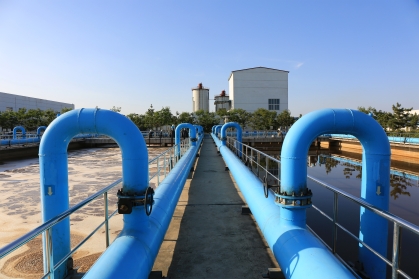
The Water Resources and Environmental Engineering program at Rutgers investigates the management of natural resources as well as environmental protection, restoration, and sustainable development. Leveraging the expertise of our faculty in applied microbiology, chemistry, fluid mechanics, hydrology, informatics, resource recovery, design, and decision-making, we pioneer innovative research in air quality, energy-related emissions, hydraulic and coastal engineering, stormwater management, water and wastewater treatment, remediation, renewable energy and products, and sustainability. With research conducted in our state-of-the-art laboratories, through computational platforms, and at the intersection of natural, agricultural, and engineered systems, our faculty members and students work closely on projects that bring substantial and enduring societal value.
Associated Faculty: Nicole Fahrenfeld, George Guo, Yalin Li, Monica Mazurek, Efthymios Nikolopoulos, Roger Wang
Research Clusters
Emerging Contaminants
Faculty: Nicole Fahrenfeld
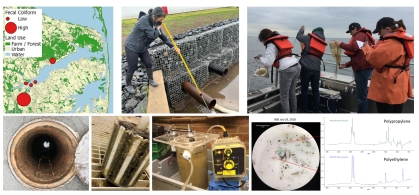
Challenges to water (drinking, waste/storm, surface, ground), air, soil, and sediment quality are evolving with the need to develop monitoring and mitigation strategies to protect public and ecosystem health while meeting ever-tightening regulatory targets. Our labs are studying emerging pathogens and organic chemical contaminants to meet the needs of a wide range of stakeholders, including utilities, regulators, and communities.
Waste Valorization and Sustainable Design
Faculty: Yalin Li
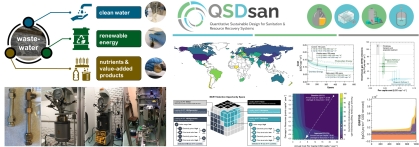
Waste and biomass represent promising renewable alternatives to fossil resources, offering society tremendous opportunities to shift from responsive pollution management to proactive generation of sustainable energy and products. At the same time, a robust and flexible design framework is needed to expedite the research, development, and deployment of such technologies and make informed decisions. Research in this area leverages experimentation and quantitative sustainable design to develop innovative technologies that are capable of destructing emerging and resistant contaminants while converting organic wastes and excess nutrients into valuable products, thus realizing simultaneous contaminant removal and resource recovery with lower costs, smaller carbon footprint, and minimal impacts to the environment. This theme directly addresses the increasingly complex challenges on infrastructure systems to meet basic human and societal needs with population growth, urbanization, and a rapidly changing environment, contributing to resilient and financially viable technological solutions that support broader goals for sustainability (e.g., resource circularity, carbon neutrality, equity).
Renewable Energy
Faculty: George Guo, Yalin Li, Roger Wang
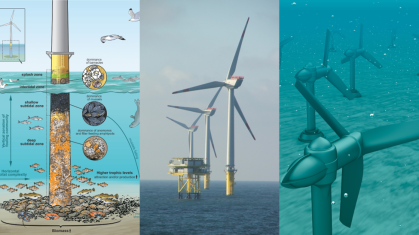
As New Jersey intensifies its transition toward green energy, the importance of specialized research in renewable energy technologies becomes increasingly critical. Our multidimensional approach includes analyzing the environmental impacts of offshore wind energy on ecology and the utilization of hydrokinetic devices for tidal and wave energy; designing the next generation of hydrokinetic devices for greater energy capture and durability; conducting comprehensive assessments of tidal and wave energy resources to guide responsible development; utilizing space-based observations for real-time monitoring of marine renewable energy projects; and applying Artificial Intelligence to predict power generation uncertainties due to environmental variables. These initiatives not only contribute to reducing greenhouse gas emissions and mitigating climate change but also aim to bolster New Jersey's energy security and stimulate economic growth. By integrating interdisciplinary methods with state-specific needs, our research endeavors to establish an energy infrastructure in New Jersey that is renewable, resilient, equitable, and economically viable.
Decarbonization Engineering
Faculty: Yalin Li, Monica Mazurek, Roger Wang
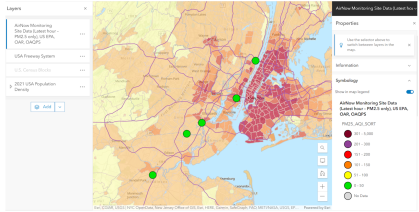
Energy-related carbon emissions caused by humans over the past 150 years have increased the concentrations of major Greenhouse Gases (GHGs) and fine particulate matter to the Earth’s atmosphere. Both emission types contribute to positive or negative climate-forcing within the Earth Climate System. Decarbonization engineering examines emerging energy production technologies, including operational data from renewable energy generation facilities and processes, which can be accelerated as replacements for fossil fuel-based technologies. We use geospatial information systems mapping and analysis software (ArcGIS Pro) to assess current and potential sites for meeting current and future energy supply and demand scenarios.
Green-Grey-Blue Infrastructure for Urban and Coastal Environments
Faculty: George Guo, Robert Miskewitz, Roger Wang
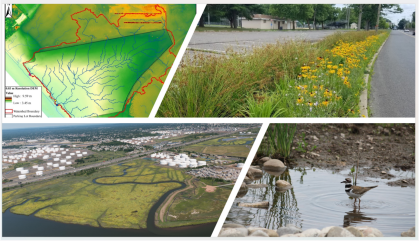
The research theme is centered on mitigating the escalating impacts of climate change and urban expansion, specifically in relation to flooding risks, community vulnerabilities, and ecosystem degradation. The approach involves a synergistic integration of green (natural and nature-based), grey (construction-based), and blue (water body-based) infrastructure, aiming to offer a multi-faceted, multi-scale, and multi-benefit solution. Methodologies for this research encompass laboratory testing, field observations, and mathematical modeling. These methods are pivotal for the data-driven planning, design, and long-term maintenance of the integrated systems. The ultimate objective is to cultivate environments that are not only resilient and sustainable but also equitable, incorporating specific adaptability measures for climate-related challenges such as extreme precipitation, hurricanes, and sea-level fluctuations.
Hydroclimatic Extremes and Climate Change
Faculty: George Guo, Robert Miskewitz, Efthymios Nikolopoulos, Roger Wang
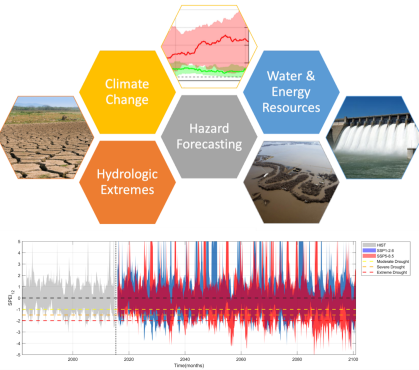
Climate change has a profound impact on the intensification of climate extremes, which challenge the reliability of current infrastructure and management of water resources. To ensure sustainability, it is required to account for the nonstationarity of climate extremes and associated hazards such as floods and droughts. Estimation of the magnitude, duration, and frequency of extremes across various temporal and spatial scales is of paramount importance for accurate risk assessment and for developing effective mitigation strategies. Integration of state-of-the-art hydroclimatic remote sensing observations with numerical models, artificial intelligence and novel statistical procedures can be used to derive robust estimates of future changes of climate extremes and support sustainable design and operation of critical infrastructure.
AI and Data Science for Emerging Environmental Sensing
Faculty: Efthymios Nikolopoulos, Roger Wang

Standing at the crossroads of technology and environmental studies, our department is deeply committed to the pivotal research topic of AI and data science for environmental sensing. We believe in the transformative power of AI, cutting-edge data analytics, and emerging sensors to decode and preserve our environment. A notable endeavor is our venture into 5G-based weather sensing, offering unparalleled data granularity in urban landscapes. Venturing beyond our planet's surface, we utilize space-age technologies to intricately monitor coastal infrastructure, high mountain climate, and ecological diversity to decipher complex hydrodynamic and hydrologic phenomena. Simultaneously, our team is breaking new ground using optical fiber, not only for weather detection but also for crucial assessments of water quality and the greenhouse gas cycle. To further our mission, we've integrated webcams and social media for real-time tracking of coastal flooding and erosion, a move that promises significant implications for coastal community strategies and preservation efforts. Blending state-of-the-art technology with a deep-seated reverence for the environment, our department's vision extends beyond mere observation — we aim to comprehend and safeguard the delicate balance of life on Earth.